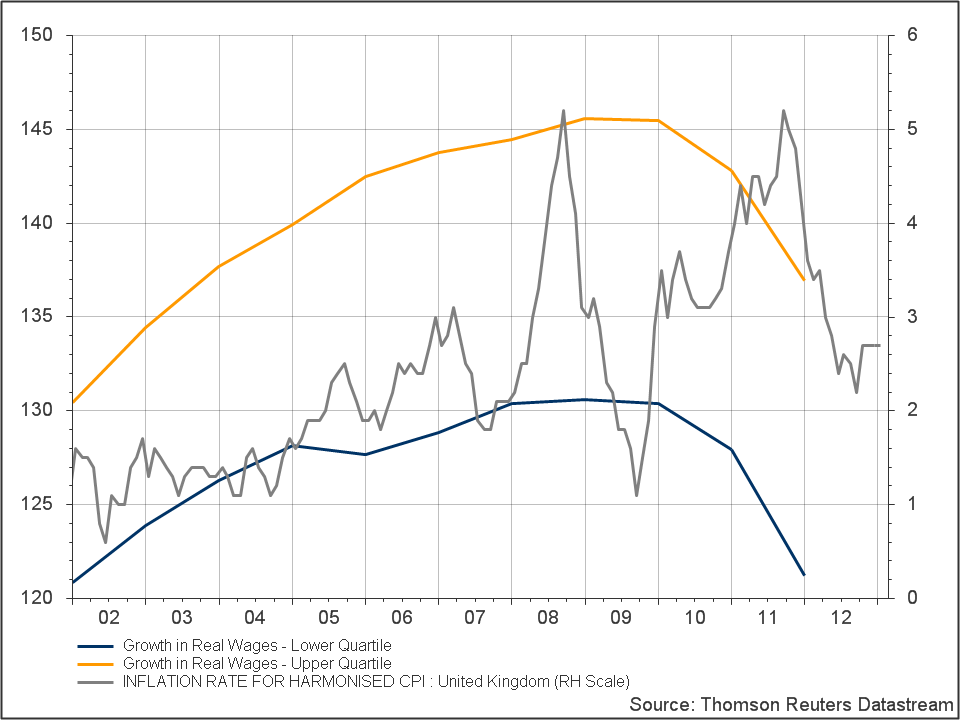When Moodys downgraded the UK on Friday, it argued that mounting debt levels in a low growth environment have impaired the sovereigns’ ability to contain negative shocks. So was the downgrade a direct result of the UK’s “austerity” approach and would “stimulus” have been a better strategy? The reality is that the austerity vs stimulus debate fails to address the underlying problem of highly indebted economies suffering from low growth. What matters is not loose monetary conditions, fiscal stimulus or fiscal austerity but rising productivity growth. This is exactly how the US economy emerged from the Great Depression in the late 1930’s. The British government, it seems, doesn’t think it can do much to help the economy, so it has outsourced the resolution of the crisis to the Bank of England. The big idea being that the central bank can use its magic powers of persuasion and force people to start spending again. The reality for the British economy is that productivity growth is poor, much of it down to existing government policy. Until the government realises that its role is to create conditions for prosperity, the UK will be hit with further downgrades due to the continuing stagnation.
Where are the magicians when you need them?
Early in February George Osbourne, Britain’s chancellor, said that the central bank needed to do more to stimulate growth because he’d been taking decisive steps on the deficit. The central bank has been shouting monetary easing from the rooftops since 2008 in the hope that people are listening and decide to start spending but to little avail. Although the monetary experiments that have been conducted have reduced the cost of debt servicing and had some impact on asset prices, there is little evidence to suggest that rising asset prices has or will lead to rising demand. William White argued convincingly in his paper ‘Ultra Easy Monetary Policy and the Law of Unintended Consequences’ that “lower interest rates cannot generate wealth, if an increase in wealth is appropriately defined as the capacity to have a higher future standard of living.” Therefore, higher asset prices only constitute wealth “if based on higher expected productivity and higher future earnings.”
Consumers need to feel wealthier if they are to start spending again, which in turn will drive up aggregate demand and investment. And the best way of getting consumers to feel wealthier is for them to actually be wealthier! Unfortunately over the last few years UK consumers have been getting poorer as highlighted by the UK Essentials Index created by Tullet Prebon. In 2012 nominal incomes only grew at 1.6% with the cost of essentials rising 3.7%.
As chart 1 demonstrates, the growth of inflation from 2006 above 2% has not helped the growth in real wages for both the lower and upper quartiles. Real wages for the bottom quartile are back to where they were in 2002 and for the top quartile back to 2004 levels. In essence when the general price level starts growing above nominal wages, an economy is in trouble. Inflation is therefore no panacea for the current predicament the UK economy finds itself in, despite central banks intimating that higher inflation is required to stimulate nominal output in the short run.
Chart 1: UK inflation vs bottom and top quartile real wages

The gospel according to Adam Smith
The answer to what is to be done however can be found in the writings of Adam Smith and the data on how the US emerged from the Great Depression. Smith observed in 18th century England that an increase in the division of labour was leading to falling prices of goods, and this fall in the price of goods generated rising real wages. The logic of today’s magic emanating from central banks is contrary to this observation as many bankers are now arguing that rising inflation is good for real incomes as it erodes the value of debt. What the UK of course needs is more productivity growth, but this is distinctly lacking at the moment particularly in the financial services sector due to a swathe of new regulations.
Conventional economic wisdom (surely an oxymoron) argues that falling exchange rates and a lower cost of funding increase the competitiveness of firms. Without doubt these two factors provide an immediate boost to profits, however they act as a disincentive to drive productivity growth as firms can grow profits by refinancing and generating higher margins for the goods in international markets due to lower exchange rates. Competitiveness is of course related to productivity and not profits. In essence, the behaviour of firms is driven by exogenous factors. Managers are paid to grow profits, not to drive productivity growth therefore they take the easiest route to generate profits.
Hence in a period of stagnant demand and a rising cost of funding, we would expect productivity to grow because it is the only source of rising profits. According to Alex Field’s data in A Great Leap forward, at least 10% of productivity growth from the Great Depression can be attributed to the economic environment forcing managers to focus on productivity. The Great Depression coincided with the fastest ever period of productivity growth in US economic history. This argument is further substantiated by the robust productivity growth of the West German economy during the 1970’s and 1980’s. The Bundesbank’s success in fighting inflation during this period led to significant rise in the value of the Deutschmark against other currencies. Moreover, its real interest rate was also higher as a result of this policy than other economies. This forced German companies to become more competitive as they had to generate larger increases in productivity growth in order to compete with companies who benefited from lower exchange and interest rates. The strength of German industry throughout this period was the main driver of the rising prosperity of West Germany. Therefore the policy of the central bank to reduce the cost of funding and the value of sterling is therefore not providing firms the right incentives to drive productivity growth. However, politically this is little appetite to raise interest rates given this will negatively impact highly indebted consumers.
That leaves the other major source of productivity growth as a potential solution which is related to the way in which the government regulates the economy – particularly in the areas of real estate, energy and transportation. Indeed, these three areas accounted for about half of the growth in total factor productivity during the Great Depression. So when Sir Mervyn King piped up on supply side issues last month at least there was some hard data to back him up. Unfortunately the UK economy has if anything seen negative growth in TFP in these sectors due to dramatically rising input costs.
Chart 2: Rising input costs – Transport, energy & housing

According to the office of rail regulation, Network Rail is up to 40% less efficient in maintaining railway tracks and stations than European rivals. Moreover, the inability of Britain’s ruling classes to resolve the saga of building an international airport with sufficient capacity since the late 1960’s is also one of the reasons why the cost of flying out of the UK is higher than from other European hubs. As for energy, the head of OFGEM has become increasingly concerned about rising energy prices, with the UK coming dangerously close to power shortages and an inevitable rise in bills. The rising cost of housing services, due to a favourable fiscal regime for property, is also one of the main reasons why inflation in the UK has remained higher than in the US. Moreover, sticky real estate prices have also been a major driver of bankruptcies across the UK retail sector. Leases in the UK are astonishingly still subject to upward only rent reviews, which means that government legislation has been protecting the profits of economic rentiers at the expense of productive enterprises and job losses. Indeed it was such behaviour by governments that protected rentiers at the expense of capital accumulation and profits why Karl Marx labelled public sector workers as being unproductive.
Conclusion
The government it seems has been unwilling to do the job they are paid to do, which as Adam Smith highlighted all those years ago, is to drive rising incomes for all. The outsourcing of the government’s core job to central banks has put central bankers in an impossible position as they don’t have the levers to drive productivity growth. Trying to convince people that they are wealthier when they know they are poorer, will neither increase output nor reduce debt. The solution is for government to ensure the economy is better regulated to drive prices down, but that would of course require the government to look beyond short term political benefits.
